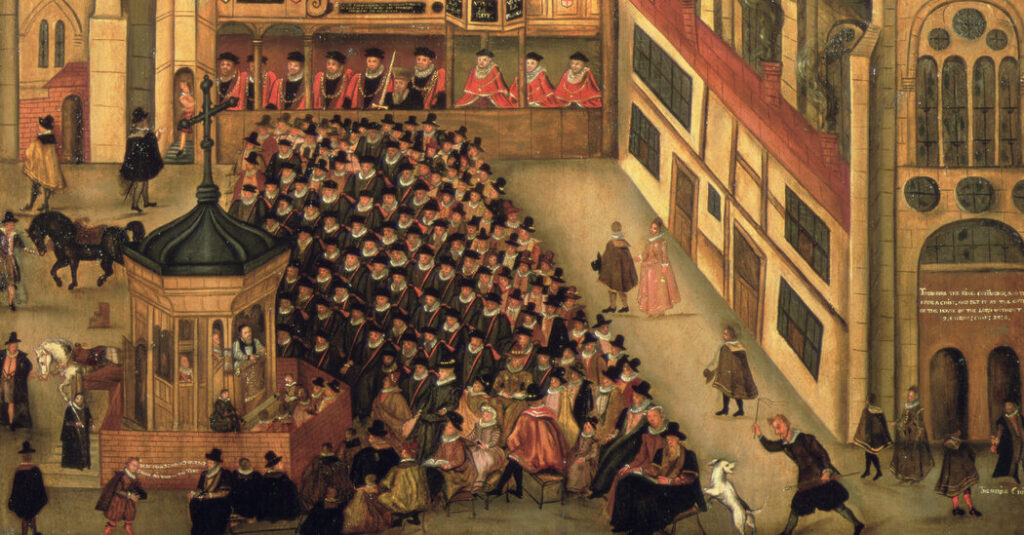THE DREAM FACTORY: London’s First Playhouse and the Making of William Shakespeare, by Daniel Swift
When London construction workers were laying the foundations for an office tower in 1989, they discovered a curious thing a few feet into the thick, bluish, waterlogged clay — a preponderance of cracked hazelnut shells. Further excavations uncovered what was clear evidence of a largely forgotten theater, and it was established by archaeologists that there was such a bevy of buried shells because the food had been sold as a concession centuries ago. Not just hazelnuts, but oyster and crab shells as well, the more affordable former located near where the groundlings would have watched a play and the expensive latter beneath the tony section.
This was the site of the Elizabethan Rose Theater, where Christopher Marlowe’s “Tamburlaine the Great” and “Doctor Faustus” most likely premiered four centuries before. Something as mundane as oysters and hazelnuts revealed a theater from the greatest age of English drama, what the scholar Daniel Swift describes in his brilliant new book, “The Dream Factory: London’s First Playhouse and the Making of William Shakespeare,” as effectively “the remnants of 16th-century popcorn.”
Snacks like these were uncovered at excavations for the Curtain (built in 1577), the Globe (in 1599) and the primogenitor of them all, the visionary entrepreneur James Burbage’s audaciously named “the Theater,” from 1576. That last institution is the subject of Swift’s book, the first comprehensive popular account of the theater that effectively established the idea of commercial drama. Less about Shakespeare than it is about Burbage (and his sons, one of whom was the talented actor Richard, who first performed Hamlet, Lear and Othello), as well as the men who constructed, financed, operated and performed at the Theater, “The Dream Factory” turns accounts of landlords arguing about mortgages and carpenters assembling wooden columns into riveting reading.
As Swift notes about Shakespeare, “Money and the law and violence and struggle are not just subjects for his plays but were the conditions for their existence as he and others fought to keep the dream factory open.” An estimably material interpretation of literary history, this book places Shakespeare in a fascinating economic context, whereby the Theater is the workshop (or studio) where he learns his trade.
The result is a kind of shadow biography of Shakespeare from the bottom up, where the title “The Dream Factory” tellingly evokes the commercial aspirations of old Hollywood, the closest cultural corollary to the Elizabethan dramatic scene. The author of books about Shakespeare and Ezra Pound, Swift is also an associate professor of English at Northeastern University London. His scholarly predilections are clearly shaped by the method of literary analysis known as the “new historicism,” in which the granular context of a given time period is considered when interpreting an author. Fittingly, “The Dream Factory” includes perceptive readings of “Romeo and Juliet” and “A Midsummer Night’s Dream.”
In understanding Shakespeare, especially his earliest plays staged at the Theater before the far more famous Globe, Swift examines men like James Burbage, as well as the investor John Brayne, the landlord Giles Allen, the comedian Richard Tarlton and even the carpenter Brian Ellam, alongside the city fathers and Protestant preachers who often denounced the performances. To that end, Swift combs through archives to find the traces of this long-ago world, and from the dross of real estate contracts and legal depositions he has written a transfixing portrait of the theater that made Shakespeare who he was.
“The Dream Factory” is an indispensable account of a chaotic and creative period in which feudalism was transitioning into capitalism, with the entertainment industry one of the salient harbingers of that shift. As the economist John Maynard Keynes argued about the Elizabethan era, “Never in the annals of the modern world has there existed so prolonged and so rich an opportunity for the businessman, the speculator and the profiteer.” More than just a story of early modern capitalism, “The Dream Factory” is a portrait of Shakespeare as a specifically working-class writer. Shakespeare was the son of a glove maker, but he was not alone in modest origins: Marlowe’s father was a cobbler, and Ben Jonson’s stepfather was a bricklayer (in fact, Jonson mostly maintained his membership dues in that professional guild).
Literature wasn’t just the result of inspired genius; it also required carpenters, weavers and bricklayers (not to mention concession sellers). However, “No profit grows where is no pleasure ta’en,” as Shakespeare writes in “The Taming of the Shrew,” for the industry invented in the neighborhood of Southwark may have relied on grubby materials but traded in stories. Posterity has remembered Shakespeare as a sui generis entity not of his time but of all time, though Swift pays him the compliment of recognizing the Bard in exactly the way that he would have recognized himself — as a laborer. Even on Mount Parnassus, there are tasks to complete; even in the fairy world, there is work to be done.
THE DREAM FACTORY: London’s First Playhouse and the Making of William Shakespeare | By Daniel Swift | Farrar, Straus & Giroux | 302 pp. | $30
The post Shakespeare Becoming Shakespeare, With Help From His Working-Class Peers appeared first on New York Times.




